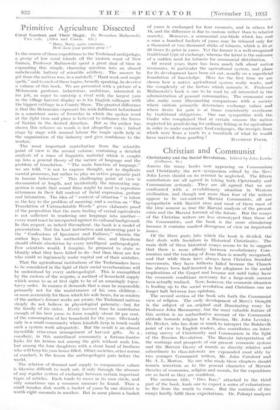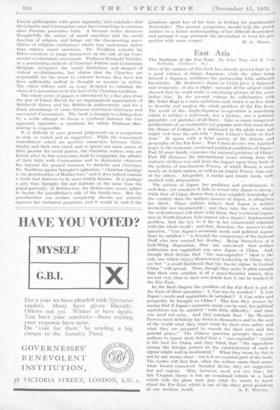Christian and Communist
Christianity and the Social Revolution. Edited by John Lewis:. (Golluncz. Os.)
AMONG the many books now appearing on Communism!: and Christ iani ty.. the newt symposium edited by the: John Lewis should on no account be neglected. The fifteen contributors are alt agreed in taking botle;Clsristianity and' Communism seriously. They are, all „agreed., that we arc confronted with a revolutionary; situation in Western: civilisation, and though not more than four of the writers; appear to be out-and-out' Marxist Communists, all are. sympathetic with Marxist aims and most of them mpst of the time assume as true the Marxist analysis of the present crisis and the Marxist forecast of the future. But the essays of the Christian writers are less stereotyped than those of . the Communists, and the book is the more stimulating. because it contains marked divergence of view on impOrtant issues..
. .
Of the three parts, into which the book . is divided, the first deals with Socialism in Historical 'Christianity.: The main drift of these historical essays.sseems; to be to suggest that there is more affinity between revolutionary Com- munism and the teaching of Jesus than is usually recognised, and that while there have always been Christian Socialist movements, they have hitherto failed because the Church has always been half-hearted in her allegiance to the social implications of the Gospel and because not until today have the economic conditions necessary for a large-scale success been actually realised. Now, however, the economic situation is leading up to the • social re-Volution and Christians can no longer halt between two opinions.
The second section of the book sets forth the Communist' view of religion. The early development of Marx's thought is .the subject of an: .original .and illuminating essay by Professor John Macmurray, but the most valuable feature of this section is an authoritative account of the Communist, attitude towards religion by a Russian, Mr. John LeViskys Dr. Hecker, who has done so much to interpret the Bolshevik' point of view to English readers, also contributes an' inters csting survey of Christianity and Communism in the light of the Russian Revolution. The Marxist interpretation of the workings and prospects of our present economic system and the Marxist theory: of morals as directly relative and ,subordinate, to class-interests are expounded most ably by two younger Communist 'writers, Mr. John Cornford and Mr. A. L. Morton. No one who reads these chapters should remain uncertain as to the general character of Marxist theories of economics, religion and morals, for the expositions are as lucid as they are confident.
The ominous title, " Dies Irae," attached to the third part of the book, leads one to expect a series of exhortations to flee from the wrath to come. But the contents of the essays hardly fulfil these expectations. Dr. Polanyi analyses Fascist philosophies with great ingenuity, and concludes that Christianity and Communism must have something in common since Fascism persecutes both. A German writer discusses thoughtfully the nature of moral sanctions and the social function of religion, and brings out the disconcerting possi- bilities of religious enthusiasm which may undermine rather than enforce moral sanctions. Dr. NeedhaM exhorti his fellow-scientists to range themselves on the side of the Com- munist revolutionary movement. Professor Reinhold Niebuhr, in a penetrating analysis of Christian Polities and Communist Religion, recognises the moral limitations and dangers of , violent revolutionaries, but claims that the Churches are responsible for the resort to violence because they have not been sufficiently radical in thought or resolute in action. . The editor follows with an essay designed to establish the claim of Communism to be the heir of the Christian tradition.
The whole series of papers is introduced by a fine plea from the pen of Canon Raven for an unprejudiced appreciation of Bolshevik theory and the Bolshevik achievement, and for a , ' frank interchange of views between convinced Christians and convinced Communists. The book is brought to a fitting close by a noble attempt to frame a synthesis between the two apparent opposites—a synthesis for which Professor Mac- murray is responsible.
It is difficult to pass general judgements on a symposium so rich, so varied and so suggestive. While the Communist contributors admit no positive connexion between Chris- tianity and their own creed, and so ignore one main source of their passion for social justice, the Christian writers, who are keenly alive to this connexion, tend to exaggerate the affinity of their faith with Communism and to depreciate whatever lies beyond the ground common to Socialist and Christian, Dr. Needham quotes Spengler's aphorism, " Christian theology is the grandmother of Bolshevism," and it does indeed contain a truth that deserves to be more widely known. It is perhaps a pity that Spengler did not indicate at the same time the grand-paternity of Bolshevism, for Bolshevism seems rather to favour the grandfather's side of the family-tree. But the grandmother can neither completely disown nor entirely approve her turbulent grandsbn, and it would be well if the
grandson spent less of his time in kicking his grandmother downstairs.. The present symposium should help the grand- mother to a better understanding of her difficult descendant, and perhaps it may persuade the descendant to treat his pro- genitor with more respect.
H. G. W000.











































 Previous page
Previous page